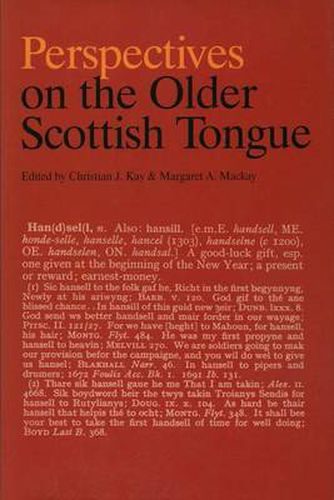Readings Newsletter
Become a Readings Member to make your shopping experience even easier.
Sign in or sign up for free!
You’re not far away from qualifying for FREE standard shipping within Australia
You’ve qualified for FREE standard shipping within Australia
The cart is loading…






This book celebrates the rich diversity of the Scots language and the culture it embodies. It marks two important events in Scots language scholarship: the completion of the Dictionary of the Older Scottish Tongue (DOST) in 2001 and the publication of its final volumes in 2002. The thirteen chapters which comprise the volume cover many aspects of Scottish life as illuminated by the words used to describe them. The writers, experts in their own fields, are linked by the fact that they have all made use of the wealth of information in DOST to advance their research. Their topics include the use of DOST in reading literature, in tracing the consumption of cereals and wine in early Scotland, in elucidating place names and terms used in shipping, building and measurement, and in defining such complex concepts as homicide and the role of the ‘gossip’. Nor is the history and structure of the dictionary itself forgotten. There is a study of its development from its beginnings in the 1920s, together with biographical notes on its editors over the years. There are also chapters drawing comparisons with the Middle English Dictionary, the Linguistic Atlas of Older Scots and the proposed historical dictionary of Scottish Gaelic. The book will thus appeal to those interested in the history of Scots and Scotland, and to those with a more general interest in the history of languages and development of dictionaries.
$9.00 standard shipping within Australia
FREE standard shipping within Australia for orders over $100.00
Express & International shipping calculated at checkout
This book celebrates the rich diversity of the Scots language and the culture it embodies. It marks two important events in Scots language scholarship: the completion of the Dictionary of the Older Scottish Tongue (DOST) in 2001 and the publication of its final volumes in 2002. The thirteen chapters which comprise the volume cover many aspects of Scottish life as illuminated by the words used to describe them. The writers, experts in their own fields, are linked by the fact that they have all made use of the wealth of information in DOST to advance their research. Their topics include the use of DOST in reading literature, in tracing the consumption of cereals and wine in early Scotland, in elucidating place names and terms used in shipping, building and measurement, and in defining such complex concepts as homicide and the role of the ‘gossip’. Nor is the history and structure of the dictionary itself forgotten. There is a study of its development from its beginnings in the 1920s, together with biographical notes on its editors over the years. There are also chapters drawing comparisons with the Middle English Dictionary, the Linguistic Atlas of Older Scots and the proposed historical dictionary of Scottish Gaelic. The book will thus appeal to those interested in the history of Scots and Scotland, and to those with a more general interest in the history of languages and development of dictionaries.